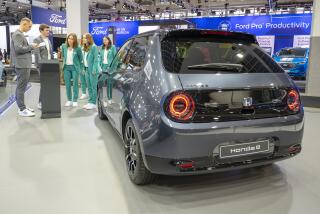GM and Honda partner to develop engines and car platforms
- Share via
General Motors Co. and Honda Motor Co. are laying the groundwork for a deeper partnership in North America to jointly develop gasoline engines and crossover SUVs, seeking to cut costs as the auto industry moves toward electric vehicles.
The two automakers signed a nonbinding memorandum of understanding to establish a North American automotive alliance, they said in a statement Thursday. While each manufacturer will sell vehicles under its own U.S. and Japanese brands, the companies will cooperate in areas such as parts and materials purchasing, research activities and connected-car services.
It marks a major step in the integration of operations at two of the world’s largest automakers, even though terms are still being worked out and the two companies don’t plan a capital tie-up. Their pairing signals the industry’s struggle to fund next-generation electric, driverless and connected technologies while still keeping their existing gas-powered car and truck businesses flush.
“This alliance will help both companies accelerate investment in future mobility innovation by freeing up additional resources,” Mark Reuss, GM’s president, said in a statement.
GM and Honda plan to jointly develop at least four crossover SUVs for the North American market, freeing up cash for battery-powered vehicles. GM is planning to sell 20 EVs globally by 2023, and Honda will develop two plug-in models using the Detroit carmaker’s Ultium battery pack.
“This is an important first step for them to see whether their partnership will create more synergies,” said Takeshi Miyao, an analyst at Carnorama in Tokyo.
If the collaboration works out as promised, analysts say the partnership could see GM and Honda move closer in terms of engineering integration and could even eventually end up with the two companies taking minority stakes in each other.
There is precedent for that since Honda already owns a minority stake in Cruise, the self-driving car company that is majority-owned by GM. Two years ago, Honda committed to investing $2.75 billion over 12 years in the venture.
Although limited geographically to North America, the alliance represents a high-stakes bet because crossover SUVs make up the bulk of the two automakers’ sales in the highly profitable region.
“GM and Honda are on a progression that could be a very big deal,” said Jeff Schuster, senior vice president of forecasting at research firm LMC Automotive. “It feels like it’s moving toward something bigger.”
The tighter collaboration to conserve capital comes as electric-car leader Tesla Inc. has benefited from an upswell in demand for its shares and as several private and recently publicly listed EV start-ups have captured the imagination of investors.
Over the last decade, carmakers have been forging increasingly close partnerships to help handle the costs of developing technology. Ford Motor Co. and Volkswagen have joined forces to develop electric vehicles and self-driving cars.
GM and Honda also will face off against other major partnerships, including the shaky alliance among Nissan Motor Co., Renault and Mitsubishi Motors Corp. They also will contend with the combined strength of Peugeot owner PSA Group and Fiat Chrysler Automobiles, which plan to merge next year.
The track record of automotive mergers and joint ventures is checkered because of the cultural and engineering challenges that come with pairing far-flung companies with distinct brand identities.
The Renault-Nissan alliance has been on the rocks since the former chairman of both companies, Carlos Ghosn, was arrested in 2018 on corruption charges and fired. Daimler‘s 1998 acquisition of the former Chrysler Corp. failed and the Germans sold it to private equity fund Cerberus Capital Management, which led it into bankruptcy.
GM has had failed equity tie-ups with Italy’s Fiat prior to the formation of Fiat Chrysler Automobiles, as well as a trio of Japanese automakers: Isuzu Motors Ltd., Suzuki Motor Corp. and Subaru Corp. when it was known as Fuji Heavy Industries Ltd. A more recent deal with Peugeot ended similarly in a write-down of GM’s investment and few joint projects to show for it.
Honda has eschewed tight partnerships and sought to remain fiercely independent, but it has collaborated with GM over the last seven years on hydrogen-powered fuel-cell system development.
GM and Honda might be more willing to share a broader range of technology thanks to trust established in their existing cooperative efforts in autonomy and fuel cells, Schuster said.
More to Read
Inside the business of entertainment
The Wide Shot brings you news, analysis and insights on everything from streaming wars to production — and what it all means for the future.
You may occasionally receive promotional content from the Los Angeles Times.










